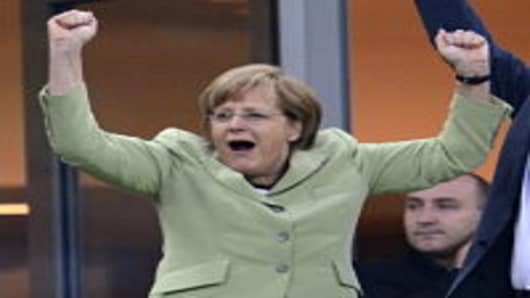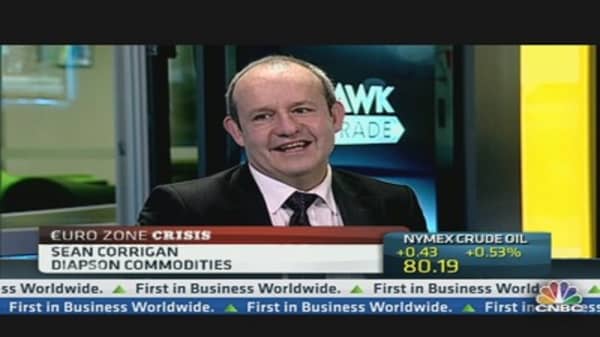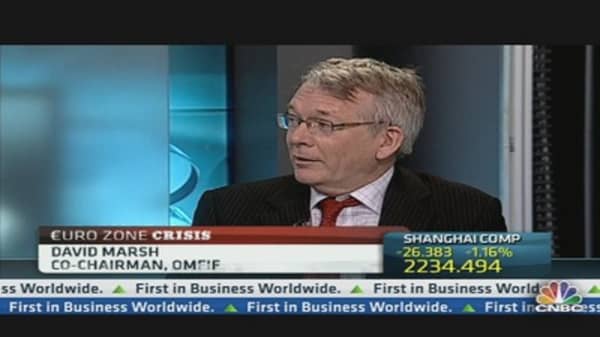As Angela Merkel packs her bags for yet another European summit, the question which has been plaguing her for the past year remains: how far will Germany go to prop up the euro zone?
On Monday, Merkel played down expectations for a swift resolution to the crisis at the summit, saying, according to Reuters, that she was concerned that the leaders would focus too much on shared liability for debt and stressing again her opposition to it.
Mutual liability for debt was both politically and economically wrong, Merkel added.
A growing number of voices in her own country are saying that maybe the expense of saving the single currency isn’t worth the economic impact on its hard-won economic health. Germany seems determined to continue dispensing harsh medicine to other less fiscally responsible euro zone countries.
Finance Minister Wolfgang Schaueble countered pleas for some easing of austerity in Greece by saying that the troubled country wasn’t trying hard enough. With an estimated bill of 671 billion euros ($838 billion) or 25 percent of GDP, according to Credit Suisse, if all Germany's commitments to the bailout funds are fully utilised, the alternative may start looking more attractive.
“There is a groundswell of opinion that the euro actually isn’t that important to Germany,” Sean Corrigan, chief investment strategist, Diapason Commodities Management, told CNBC Monday.
“Everyone else has attacked Merkel so much it’s her Falklands moment almost. German people are drawing ranks around her and I don’t think they’re going to move.”
While much has been written about the importance of a weak euro to German exports, the currency's depreciation could also mean that more German businesses will become potential takeover targets, which would not be well-received in the country, according to David Marsh, co-chairman, OMFIF.
“Germany’s caught between very unpleasant economic and political consequences of either saving the euro or letting it go down. Either way, it’s going to expose them to enormous risks and costs,” he told CNBC Monday.
What Germany Wants
Essentially, what Germany wants in return for propping up the euro zone, whether via joint Eurobonds or other methods of fiscal consolidation, is more centralized, EU control of elements like national budgets.
There is deep-seated suspicion about Germany’s motives in those countries it previously occupied. Greece, where one of the leaders of the resistance to Nazi occupation has recently become a political figurehead for left-wing Syriza, is a prime example of somewhere where memories of brutality during World War II still hold sway.
Of course, Merkel would probably turn up to Wednesday’s summit in lederhosen before she’d think about extending German power beyond its current borders. At the moment, Germany appears to want to preserve its economic might rather than extend its political power.
“This is a wonderful game because the rest of Europe wants to move towards this without giving up their own sovereignty. She’s playing a very clever game and saying she’ll do all this stuff properly, and she knows all the other guys aren’t going to go down that route with her yet,” Corrigan said.
Billionaire investorGeorge Soros warned Monday that Germany's resistance could be "fatal" to the euro.
Germany’s own economy is treading water as the euro zone crisis affects growth. The IFO business index fell to 105.3 in June from 106.9 in May, while manufacturing PMIs show lowered export expectations, both of which point to a weak economic outlook for Germany in the second half of 2012. Analysts at Barclays predict that Germany’s GDP will have grown by 0.2 percent in the second quarter.
While the German parliament is expected to approve the European Stability Mechanism (ESM) – Europe's permanent rescue fund - and the fiscal compact designed to tighten fiscal discipline agreed in December on Friday, Die Linke, the left-wing party, is expected to delay the law by filing a constitutional complaint which will demand that the Constitutional Court gives its go-ahead first.
Merkel also has her hands tied by the need for a two-thirds majority, which will likely mean she has to give ground to the left-leaning German opposition, who want more spending on job creation projects.
“The rational thing is to continue preaching a very hard line, but making some last-minute concessions. The trouble is these will not be enough to rescue Greece, Italy or Spain,” Marsh said.
“We should look at the possibility that we will get out into the abyss. She’s captain of the German team, not the European team,” he added.
And let’s not forget that the German soccer team beat Greece under her watchful gaze Friday – with Italy next in line against the Germans in the semi-final on Thursday.






